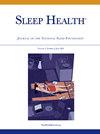The temporal relationship between long sleep duration and poor hand grip strength in older adults: The Yilan study
IF 3.4
2区 医学
Q2 CLINICAL NEUROLOGY
引用次数: 0
Abstract
Objectives
Muscle strength is an important subdomain of intrinsic capacity in older adults. Although poor muscle strength is closely correlated with long sleep duration, a causal relationship has not yet been established. This study aimed to examine whether long sleep duration predicted a decrease in hand grip strength or vice versa.
Methods
In this follow-up study involving a community-based fixed cohort, participants included community-dwelling older adults aged ≥65 years residing in Yilan City, Taiwan. Self-reported sleep duration at night was categorized as short (<6 hours), mid-range (6 to <8 hours), and long (≥8 hours). Hand grip strength was measured using a dynamometer, and poor hand grip strength was defined by age- and sex-specific cutoffs based on one standard deviation below the age- and sex-specific means of the data. Two temporal directions of analyses were performed between sleep duration and hand grip strength. First, baseline participants with good hand grip strength were followed-up to examine whether baseline long sleep predicted poor hand grip strength. In contrast, baseline mid-range sleepers were followed-up to examine whether baseline poor hand grip strength predicted long sleep.
Results
A total of 539 individuals, with an average age of 74.5 ± 5.5 years, participated in the study. The average follow-up period was 5.8 ± 1.8 years. Regarding factors predicting a decrease in hand grip strength, after controlling for various confounders, long sleep duration at baseline predicted incident poor hand grip strength at follow-up visits (odds ratio, 2.63; 95% confidence interval, 1.27-5.43). Conversely, poor hand grip strength failed to predict lengthening of sleep duration.
Conclusion
In older adults, long sleep duration preceded a decrease in hand grip strength.
老年人睡眠时间长与握力差的时间关系:宜兰研究。
目的:肌力是老年人内在能力的一个重要子域。虽然肌肉力量差与睡眠时间长密切相关,但因果关系尚未确定。这项研究的目的是研究长时间睡眠是否会导致手部握力下降,反之亦然。方法:采用以社区为基础的固定队列随访研究,研究对象为居住在宜兰市的≥65岁的社区老年人。自我报告的夜间睡眠时间被归类为短(结果:共有539人参加了这项研究,平均年龄为74.5±5.5岁。平均随访时间为5.8±1.8年。对于预测手握力下降的因素,在控制了各种混杂因素后,基线时的长睡眠时间预测随访时发生的手握力下降(优势比,2.63;95%置信区间,1.27-5.43)。相反,握力差并不能预测睡眠时间的延长。结论:在老年人中,长时间睡眠导致了手握力下降。
本文章由计算机程序翻译,如有差异,请以英文原文为准。
求助全文
约1分钟内获得全文
求助全文
来源期刊

Sleep Health
CLINICAL NEUROLOGY-
CiteScore
6.30
自引率
9.80%
发文量
114
审稿时长
54 days
期刊介绍:
Sleep Health Journal of the National Sleep Foundation is a multidisciplinary journal that explores sleep''s role in population health and elucidates the social science perspective on sleep and health. Aligned with the National Sleep Foundation''s global authoritative, evidence-based voice for sleep health, the journal serves as the foremost publication for manuscripts that advance the sleep health of all members of society.The scope of the journal extends across diverse sleep-related fields, including anthropology, education, health services research, human development, international health, law, mental health, nursing, nutrition, psychology, public health, public policy, fatigue management, transportation, social work, and sociology. The journal welcomes original research articles, review articles, brief reports, special articles, letters to the editor, editorials, and commentaries.
 求助内容:
求助内容: 应助结果提醒方式:
应助结果提醒方式:


